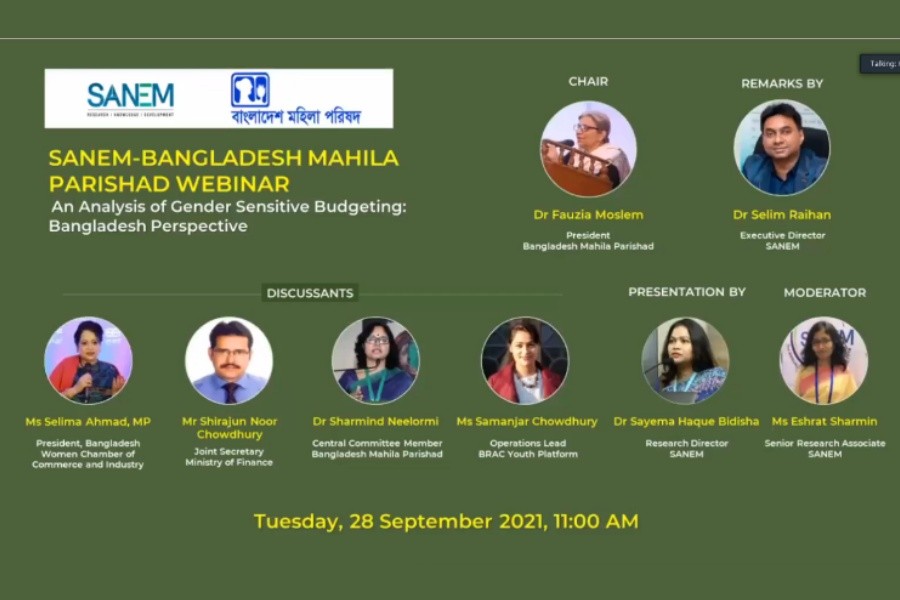Women's participation in the economic decision-making is still poor in the country even though their employments have increased substantially in the last decade, speakers at a webinar on Tuesday said.
Despite significant allocations in the gender budget, they also said, women don't get its full benefits as those are not duly implemented.
The observations came at a webinar on 'An Analysis of Gender-Sensitive Budgeting: Bangladesh Perspective' jointly organised by South Asian Network on Economic Modelling (SANEM) and Bangladesh Mahila Parishad (BMP).
BMP President Dr Fauzia Moslem chaired the function while Executive Director of SANEM Dr Selim Raihan made the opening remarks.
Research Director of SANEM Dr Sayema Haque Bidisha presented a keynote paper and Senior Research Associate of SANEM Eshrat Sharmin moderated the discussion.
President of Bangladesh Women Chamber of Commerce and Industry (BWCCI) Selima Ahmad MP, Central Committee Member of BMP Professor Dr Sharmind Neelormi, Operations Lead of BRAC Youth Platform Samanjar Chowdhury took part in the panel discussion.
Dr Fauzia Moslem said BMP has been working on gender budgeting since 1990 that eventually led to almost 43 ministries to work on the concept.
The impacts of gender budgeting on reducing gender equality need to be assessed, she added.
In his opening remarks, Dr Selim Raihan said all stakeholders including government and political parties acknowledge the importance of women empowerment.
"Even important documents like five-year plan or national budget also acknowledge the importance of women empowerment, but we want to see whether the acknowledgement is reflected in pragmatic action," said Mr Raihan, also an economics professor at Dhaka University.
Hailing the comprehensive outline of the gender budget, he underscored the need for making a proper assessment of their implementation and identifying the barriers.
Sayema Haque Bidisha in her keynote paper said analysis criteria of the gender budget should be more specific, objective and transparent.
She said gender-disaggregated data on beneficiaries and impacts, discontinuation of certain important projects, absence of international best practices and poor monitoring and evaluation of the gender budget are some of the key challenges.
The presentation recommended strengthening monitoring and evaluation of the projects, prioritising programmes directly connected to gender parity in line with sustainable development goals, introduction of a dedicated cell at the finance ministry in participation with gender budget experts.
It also called for greater coordination among ministries to improve institutional capacity, strengthening the capacity of the ministry of women and children affairs as the lead ministry.
Ms Selina Ahmad highlighted the importance of increased gender allocation towards women in the grassroots-level population of the country.
Mentioning the Prime Minister's enthusiasm about women's rights and affairs, Ms Ahmad said all government bodies have to be involved with enthusiasm.


